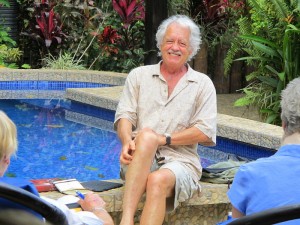 Award-winning Canadian novelist William Deverell was a featured speaker at my Namaste Gardens Writing & Yoga Retreat in Costa Rica last month. Against a backdrop of lush foliage, cascading flowers and startling blue pool, and with the occasional curious tropical bird or butterfly pausing to watch, he shared with retreat participants and visiting writers from the capital city of San Jose his thoughts on “A Writer’s Life.” Here are 10 tips gleaned from his presentation.
Award-winning Canadian novelist William Deverell was a featured speaker at my Namaste Gardens Writing & Yoga Retreat in Costa Rica last month. Against a backdrop of lush foliage, cascading flowers and startling blue pool, and with the occasional curious tropical bird or butterfly pausing to watch, he shared with retreat participants and visiting writers from the capital city of San Jose his thoughts on “A Writer’s Life.” Here are 10 tips gleaned from his presentation.
1. Write what you dream of writing — not what others want you to write.
Though he aspired to be a writer even as a teen — he read us a few angst-ridden journal entries to prove it — and worked for many years as a journalist and later a lawyer, he was thirty-nine years old before he finally took a sabbatical plunge into novel writing. He describes the writer’s block he suffered, even during the early days of his sabbatical, as “pathological.”
He eventually recognized that he’d been hampered by his father’s high literary standards, fearing he’d disappoint if he didn’t write a “serious novel.” His father was a journalist and a reader of classics who suffered from unfulfilled literary aspirations. Bill says his own fear of failure began in his teens, prevented him from writing for decades, and even “drove him” to the law. (“I never wanted to be a lawyer,” he says.)
Though saddened by his father’s death, he also felt suddenly “unchained” in his writing and free to leave behind his earlier efforts — to begin writing what he wanted to write.
2. Write what you know.
Bill says it took him many years to realize that as a criminal lawyer he had the fodder for stories — characters, plots, human drama and emotion — swirling around him. He just had to pay attention. His first novel was a thriller that used his knowledge of both the criminal underbelly of Vancouver and “the pompous theatre of the courtroom.” At the heart of the plot of his first novel, Needles, was a murder case he had prosecuted. And his second novel, High Crimes, which followed a gang of Newfoundland drug smugglers, was “frankly fact-based.” His novel The Laughing Falcon is set in Costa Rica, a country that he has come to know well.
3. Push boundaries. Experiment.
As Bill talks about his career it’s clear he enjoys trying new things, challenging himself. Over time, for example, he became more confident about including humour in his short stories and novels. And on several occasions he’s stretched himself by tackling writing from a woman’s point of view. His sixteenth and most recent novel, I’ll See You in My Dreams, is experimental in structure, including as it does narrative that moves between the present and the 1960s, and excerpts from a fictional memoir and a fictional biography.
4. Defy stereotypes.
Bill maintains that the only real thriller he ever wrote was his first novel. Publishers and bookstore owners, he says, want to slot an author into a genre because it makes books easier to sell. [Editor’s note: He seems to be ignoring the small matter of all those crime-writing awards!] Still, in some of his novels he has moved away from crime writing. In Trial of Passion (2002), for example, there is no murder — nor even any blood.
5. Know your characters.
It’s important for writers to outline their characters, he says, to know them inside and out. Consistency and continuity are particularly important in Bill’s writing because barrister Arthur Beauchamp and several other characters appear in more than one of his novels.
Characters don’t always come from life, he says, but they are often made of “scraps of reality” and then take on a life of their own. And it works both ways: sometimes while writing, he temporarily takes on the persona of a character he’s created — he freely admits this doesn’t necessarily make him popular with family and friends — a Buddhist guru, for example, or a depressed eco-neurotic jungle guide.
But will your “characters” know themselves? Bill once based one of his on someone with whom he’d worked: a real-life conniving prosecutor and master of locker room humour. He wrote his “bête noire” into a story as a sort of revenge. Sometime after the novel came out, he was in the Vancouver courthouse and ran into the fellow (by then a judge), fearing the worst. The judge proclaimed the novel Bill’s best yet, and said the characters “rang true” — apparently unaware that one was modelled on him.
6. Don’t waste words on meaningless dialogue.
All dialogue in a story should have a purpose, says Bill. Listen to the way people talk, but remember that they don’t speak on the page like they do in real life. Strive to “capture the way people can express themselves in entertaining ways.” Be sure to differentiate each character’s voice and personality. And for the most part, avoid dialogue tags other than he said or she said. “Don’t try to fancy it up.”
7. Commit to a writing routine.
Bill writes almost every day, whether he’s at home in Canada or wintering in Costa Rica. In Canada, he works from a cabin away from home, without phone or Internet. While in Costa Rica, despite its many allures — not to mention the temptations of online bridge and chess (because there he does have Internet) — he writes for at least two hours each day.
8. Roam your “wooded hills” (wherever they may be).
Writing is solitary and sedentary, but that doesn’t mean a writer always has to be. In Costa Rica, Bill gets up at six every morning and takes a walk down the hill from his home to the beach and back before settling down to write. He likes to quote the German physicist Helmholtz, who said that great ideas come not at the worktable or when the mind is fatigued, but “come particularly readily during the slow ascent of wooded hills on a sunny day.”
9. Appreciate those who share and/or support your passion.
Bill and his delightful wife, Tekla, who came along for his talk at the retreat, have been married for 53 years. He told the audience that she’s still his biggest fan. And in fact I saw her in action. Following his talk and before lunch, she took a short walk down the quiet road on which Namaste Gardens is located — and returned shortly with a curious fellow Canadian in tow, a renter down the way with whom she had gotten to chatting about Bill and his books . . .
10. Love what you’re writing now.
In passing, Bill described his most recent novel, I’ll See You in My Dreams, as his favourite so far. When I asked why, he laughed. “My most recent book is always my favourite.”
* * *
 WILLIAM DEVERELL is the author of sixteen novels and one true-crime book, and the recipient of numerous literary awards, including the Arthur Ellis Award for Excellence in Canadian Crime Writing. Before publishing his first novel in 1979, he was a journalist for seven years with the Canadian Press in Montreal and the Vancouver Sun, worked his way through law school as night editor of the Saskatoon Star-Phoenix, and practised criminal law. William has also written short stories, radio plays, TV scripts and screenplays, including Shellgame, which served as the pilot for CBC’s widely syndicated series Street Legal. His novels have been translated into fourteen languages. He divides his time between Pender Island, British Columbia, in Canada, and Manuel Antonio, Costa Rica. Read more about William Deverell here. Visit his website at http://deverell.com
WILLIAM DEVERELL is the author of sixteen novels and one true-crime book, and the recipient of numerous literary awards, including the Arthur Ellis Award for Excellence in Canadian Crime Writing. Before publishing his first novel in 1979, he was a journalist for seven years with the Canadian Press in Montreal and the Vancouver Sun, worked his way through law school as night editor of the Saskatoon Star-Phoenix, and practised criminal law. William has also written short stories, radio plays, TV scripts and screenplays, including Shellgame, which served as the pilot for CBC’s widely syndicated series Street Legal. His novels have been translated into fourteen languages. He divides his time between Pender Island, British Columbia, in Canada, and Manuel Antonio, Costa Rica. Read more about William Deverell here. Visit his website at http://deverell.com